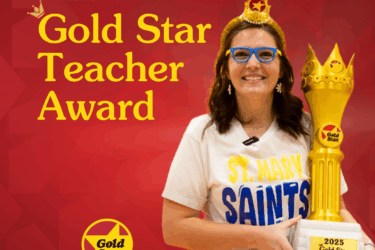When your child shows academic promise, the best thing you can do is challenge her.
 Have you ever met a 4-year-old who could read the latest Harry Potter book faster than you, or seen a 7-year-old solve a high school calculus problem, or challenged a 5-year-old to a geography bee – and lost?
Have you ever met a 4-year-old who could read the latest Harry Potter book faster than you, or seen a 7-year-old solve a high school calculus problem, or challenged a 5-year-old to a geography bee – and lost?
While every parent believes their child is the most special, most brilliant, most unbelievably advanced child who was ever born, the fact remains that only an approximate 6 percent of school-aged children are truly academically gifted, according to the National Association of Gifted Children (NAGC).
What does that mean? According to Tennessee’s Department of Education guidelines, “intellectually gifted” is defined as “having intellectual abilities and potential for achievement so outstanding that special provisions are required to meet the child’s educational needs.”
If you suspect your child is intellectually gifted, or even academically advanced, there are numerous ways to nurture even the youngest child’s emerging talents. The most important thing you can do is to know your options and explore them – for your child’s sake.
Birth to 3 Years Old: Stimulate, Stimulate, Stimulate!
With young children, the key is to pay attention to and discover giftedness early on. Look for talents that may present themselves in subtle ways. Did your baby roll over at 2 months instead of the typical 3? Was she walking by 9 months instead of the standard 12-and-a-half? Was she speaking simple sentences at a mere 17 months versus the average 24? Signs like these should be the first clue that your child may be on the track to advanced learning. So what do you do about it?
First of all, it’s essential to recognize the difference between pushing and challenging your child. Pushing her can crush her interest in learning, whereas challenging can actually enhance it. According to Burton L. White, author of A Parent’s Guide to the First Three Years (Prentice-Hall), the time to really hone in on your child’s potential is between 8 and 18 months of age. White asserts that it’s critical to have plenty of stimulating, age-appropriate toys and books always within arm’s reach. He also says that parents of a child this age should have lots of interaction with her, and they should encourage, support and stimulate – not smother – her.
Urge your child to explore everything, within the confines of a safe environment. Exploration can start before she learns to crawl or walk. Carrying her in a forward-facing position allows a child to take in the world around her. Talking to her constantly nurtures an interest in language development and conversation.
Additionally, you can never read enough books with your small child. While the pictures are of great interest to young eyes, word association can begin at a young age, as can simple word recognition. This can put her ahead of the game when it comes time to read.
Preschool Through Sixth Grade: Encore
The Metro Nashville Public School system has a free special education program called Encore, which is designed to meet the needs of children in PreK3 through sixth grade who require more of a challenge than they’re getting in the general education classroom. Established in 1984, Encore was created for “children who meet state special education criteria as intellectually gifted, or local general education criteria as academically talented,” says Beth O’Shea, Encore director.
To attend Encore, students are first identified as gifted based on their achievement and cognition test scores. Generally speaking, these are children who score in the top 4 percent on various assessments. At the end of the 2002 – 03 school year, 1,806 students in Metro’s school were identified as eligible for the Encore program.
Students in Encore are grouped in multi-age classes: ages 3 – 5, grades K – 2, grades 3 – 4 and grades 5 – 6 and attend the program for half a school day once a week. While school-aged students must attend a Metro public school in order to participate in Encore, preschool-aged participants can come from a private or homeschool as well as a Metro preschool program.
Encore focuses heavily on “developing students’ higher level thinking abilities with an emphasis on building both their creative and critical thinking skills,” says O’Shea. “Encore students are involved in hands-on learning and solving of real-world problems.” Primary focus is placed on the arts and sciences, which includes social science and the humanities.
“We see giftedness as potential, and productivity as the desired outcome,” says O’Shea, “but parents are the first teachers of their children. (They) must instill a love of literature by reading to their children as much as possible.”
To learn more about Encore, visit www.nashville.k12.tn.us/encore/index.htm or call 333-5175.
Middle School: Mentoring
Students in seventh and eighth grades are the perfect age for taking part in a mentoring program. Perhaps your child has gone about as far as school will take her on the topic of arachnids or aviation, but she’s still thirsty for more. Mentoring can satiate that desire by pairing a child with an expert in the field in which the young person is interested. It will provide her with an opportunity to explore a potential career direction or merely further her already-expansive knowledge of a subject she’s passionate about.
The beauty of a mentorship is that the student can spend as much or as little time as she desires with the mentor, but odds are, she’ll be greatly enthusiastic about having someone in her life who shares a common interest, and a life-long friendship will blossom.
Establishing a mentor relationship is quite simple. According to Parenting for High Potential, a monthly publication put out by the NAGC, parents should “take into account their child’s gifts and talents. Then, find experts in that area.” How? You can start by talking to your child’s teacher who instructs the subject of interest or contacting the local chapter or organization that deals with the particular topic.
Other places to look include local museums, historical societies, or national gifted groups (see sidebar at left). Another way to locate a mentor is simply by word of mouth. A friend of a friend might know someone who would be interested in taking your young talent under his wing. The options are limitless, and the experience will last a lifetime.
High School: Advanced Placement
For high school students, the best source of academic challenge comes from Advanced Placement (AP) classes. AP classes are equivalent to the challenge of a college course in the same subject. Students are usually required to do more reading and writing, material analyzation, idea formation, problem solving and evaluation. At the end of the year, the student takes an exam, and depending on his score, the AP class will transfer into college credits.
This means fewer credits he’ll need to take in college, which will save money in the long run. The best part about this is that last year, more than 3,000 colleges in 22 countries accepted AP exam grades. And when a college sees high school AP classes on the application, the light turns green much quicker for the applicant’s acceptance. Students who are interested in tackling something bigger should talk to the high school guidance counselor or the teacher of the AP class they are interested in taking.
There are many children in Middle Tennessee who have talents for academia. But if those talents go unexplored, that child’s true potential is being compromised, leaving a void in what could be a very bright future. Whatever you do, don’t let your child’s mind go unchallenged – you could have a mini-genius on your hands and not even know it. Make sure you open all the doors that are available, and watch her mind grow with all the world has to offer.
Ashley Driggs is associate editor for this publication.
Sources: The National Association for Gifted Children, Parenting for High Potential, Tennessee Guidelines for the Identifying Children with Disabilities: Intellectually Gifted.
HELPFUL RESOURCES
If you are looking for additional resources, call these national associations or visit their websites.
The Association for the Gifted (TAG)
www.cectag.org
319-266-0205
American Association for Gifted Children
919-783-6152
http://www.aagc.org/
Hollingworth Center for Highly
Gifted Children
207-655-3767 or 508-597-0977
http://www.hollingworth.org
National Association for Gifted Children (NAGC)
202-785-4268
http://www.nagc.org/
Supporting the Emotional Needs of the Gifted, Inc. (SENG)
602-381-1400; 800-222-8221
http://www.SENGifted.org/
ADDITIONAL READING
The Survival Guide for Parents of Gifted Kids: How to Understand, Live With and Stick Up for Your Gifted Child
By Sally Yahnke Walker, Ph.D.
(Free Spirit)
Your Gifted Child: How to Recognize and Develop the Special Talents in Your Child from Birth to Age Seven
By Kathleen Veenker, Stephen Veenker, Joan Franklin, M.A. Smutny
(Ballantine)
You Know Your Child is Gifted When … A Beginner’s Guide to Life on the Bright Side
By Judy Galbraith, M.A., Illustrated by Ken Vinton, M.A.
(Free Spirit)




